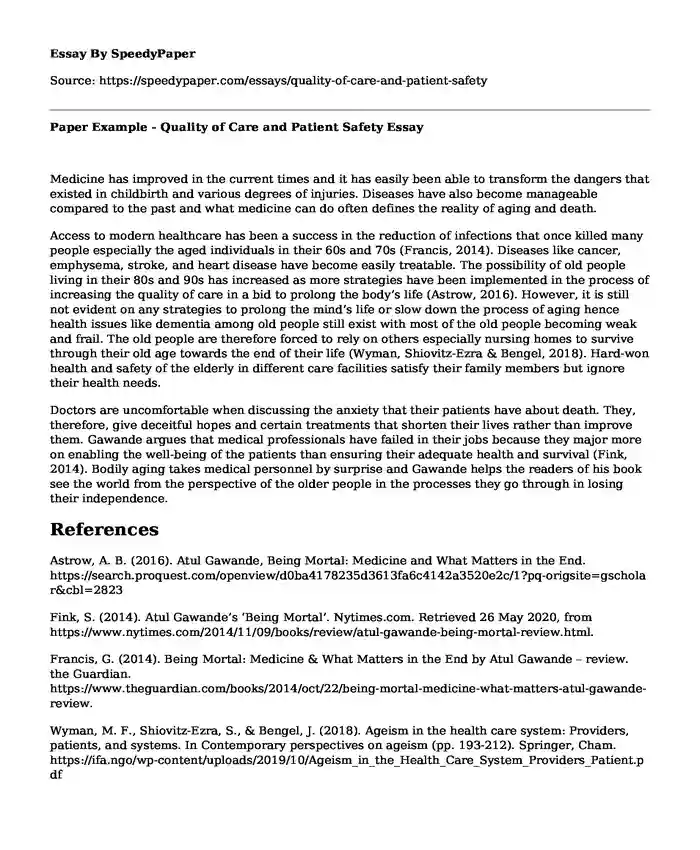
| Type of paper: | Essay |
| Categories: | Medicine Healthcare |
| Pages: | 2 |
| Wordcount: | 390 words |
Medicine has improved in the current times and it has easily been able to transform the dangers that existed in childbirth and various degrees of injuries. Diseases have also become manageable compared to the past and what medicine can do often defines the reality of aging and death.
Access to modern healthcare has been a success in the reduction of infections that once killed many people especially the aged individuals in their 60s and 70s (Francis, 2014). Diseases like cancer, emphysema, stroke, and heart disease have become easily treatable. The possibility of old people living in their 80s and 90s has increased as more strategies have been implemented in the process of increasing the quality of care in a bid to prolong the body’s life (Astrow, 2016). However, it is still not evident on any strategies to prolong the mind’s life or slow down the process of aging hence health issues like dementia among old people still exist with most of the old people becoming weak and frail. The old people are therefore forced to rely on others especially nursing homes to survive through their old age towards the end of their life (Wyman, Shiovitz-Ezra & Bengel, 2018). Hard-won health and safety of the elderly in different care facilities satisfy their family members but ignore their health needs.
Doctors are uncomfortable when discussing the anxiety that their patients have about death. They, therefore, give deceitful hopes and certain treatments that shorten their lives rather than improve them. Gawande argues that medical professionals have failed in their jobs because they major more on enabling the well-being of the patients than ensuring their adequate health and survival (Fink, 2014). Bodily aging takes medical personnel by surprise and Gawande helps the readers of his book see the world from the perspective of the older people in the processes they go through in losing their independence.
References
Astrow, A. B. (2016). Atul Gawande, Being Mortal: Medicine and What Matters in the End. https://search.proquest.com/openview/d0ba4178235d3613fa6c4142a3520e2c/1?pq-origsite=gscholar&cbl=2823
Fink, S. (2014). Atul Gawande’s ‘Being Mortal’. Nytimes.com. Retrieved 26 May 2020, from https://www.nytimes.com/2014/11/09/books/review/atul-gawande-being-mortal-review.html.
Francis, G. (2014). Being Mortal: Medicine & What Matters in the End by Atul Gawande – review. the Guardian. https://www.theguardian.com/books/2014/oct/22/being-mortal-medicine-what-matters-atul-gawande-review.
Wyman, M. F., Shiovitz-Ezra, S., & Bengel, J. (2018). Ageism in the health care system: Providers, patients, and systems. In Contemporary perspectives on ageism (pp. 193-212). Springer, Cham. https://ifa.ngo/wp-content/uploads/2019/10/Ageism_in_the_Health_Care_System_Providers_Patient.pdf
Cite this page
Paper Example - Quality of Care and Patient Safety. (2023, Aug 14). Retrieved from https://speedypaper.net/essays/quality-of-care-and-patient-safety
Request Removal
If you are the original author of this essay and no longer wish to have it published on the SpeedyPaper website, please click below to request its removal:
- Essay Sample on Obesity among Children
- Research Paper Sample on Legionnaire's Disease
- Essay Example: Implementing Policies in the Healthcare Delivery System
- Essay Example: Background of Why the Study Was Done
- Essay Sample on Amazon's Organizational Behavior
- Hunger in the USA: Why Food Is Going to Waste Instead of People's Stomachs - Essay Sample
- Essay Sample on Leadership in Healthcare: Essential for Effective Delivery of Services
Popular categories




